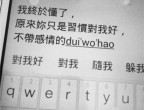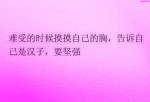
家庭规则英语作文50词带翻译【一】
In the morning, the lake under the mountain is like a big mirror. The fish in the lake have a good time.
早晨,人们也出来活动了。四个小孩在进行跑步比赛,他们跑了一圈又一圈,累得汗水直流,他们想:不管怎么样,一定要跑到终点。老人们在打太极拳,一位老爷爷对着他前面的`老爷爷说:“加油!”大哥哥们又唱又跳的,真热闹呀!
In the morning, people came out to have activities. Four children are running race, they run circle after circle, tired sweat, they think: no matter what, must run to the end. The old people are playing Taijiquan. An old man says to the old man in front of him, "come on!" Big brother is singing and dancing. It's so lively!
大家玩得好开心!
Have a good time!
家庭规则英语作文50词带翻译【二】
One Sunday my mother (Mother had (made me take my little young brother to the a trip to the country. She bade me take good care of him.
While we were walking along the road, the sun was shining brightly and the breeze was blowing gently. We saw the beautiful flowers smile (smiling at us and heard the birds sing (singing their sweet songs on the trees. The scenery was indeed very pretty (beautiful.
When we felt tired, we returned home. We saw Mother (our mother wait (waiting for us at the door.
有一个星期日,我母亲叫我带小弟弟去乡村游历。她吩咐我要好好照料他。
当我们沿着道路行走的.时候,太阳灿烂地照耀着,微风轻轻地吹着。我们看见美丽的花儿对我们微笑着,并听见鸟儿在树上唱着悦耳的歌曲,风景实十分美丽。
当我们感觉到疲倦的时候,我们就回家了。我们看见母样正在门口等候我们。
家庭规则英语作文50词带翻译【三】
Therearesomecherriesinthebasket.(一般疑问句,否定回答划线部分提问Kittylikesthebluedress.(用thepinkdress改为选择疑问句Don`tplaywithfires.(换一种说法
Joelikesreading.Dannylikesreadingtoo.(把两句连成一句Pleaseeatsomecakesandbiscuits.(改为否定句划线部分提问Thereissomewaterintheglass.(划线部分提问划线部分提问Whatdayistoday?
What`sthedatetoday?
Whatdoyouusuallydoafterdinner?
Whichpearsdoyouwant,thegreenonesortheyellownoes?Whichwesternholidaydoyoulikebest?Whenisit?
WhatdoyoudoattheLanternFestival?
5B2
Thosebooksareours.(同义句划线部分提问划线部分提问
ThosecrayonsareDanny`s.(.(用Alice改为选择疑问句Arethesetheirschoolbags?(单数句划线部分提问
Theyridetheirbicyclestothepark.(用May改写
Thecocooniswhite.(用browng改为选择问句划线部分提问Heisfouryearsold.(改为一般过去时
Iwasathomeyesterdayevening.(改为一般疑问句
Thecaterpillarslikeeatingleaves.(改为单数句划线部分提问划线部分提问
WhatdoyoueatattheMid-autumnFestival?(根据实际情况回答
家庭规则英语作文50词带翻译【四】
The Father and His Son
Father had a family of sons who were perpetually quarrelling among themselves. When he failed to heal their disputes by his exhortations, he determined to give them a practical illustration of the evils of disunion; and for this purpose he one day told them to bring him a bundle of sticks. When they had done so, he placed the faggot into the hands of each of them in succession, and ordered them to break it in pieces. They each tried with all their strength, and were not able to do it.
He next unclosed the faggot, and took the sticks separately, one by one, and again put them into their hands, on which they broke them easily. He then addressed them in these words: "My sons, if you are of one mind, and unite to assist each other, you will be as this faggot, uninjured by all the attempts of your enemies; but if you are divided among yourselves, you will be broken as easily as these sticks."
一位父亲有几个孩子,这些孩子时常发生口角。他丝毫没有办法来劝阻他们,只好让他们看看不合群所带来害处的例子。为了达到这个目的,有一天他叫他们替他拿一捆细柴来。当他们把柴带来时,他便先后地将那捆柴放在每一个孩子的手中,吩咐他们弄断这捆柴。他们一个个尽力去试,总是不能成功。
然后他解开那捆柴,一根根地放在他们手里,如此一来,他们便毫不费力地折断了。于是他就告诉他们说:「孩子们!如果你们大家团结一致,互相帮助,你们就像这捆柴一样,不能被你们的敌人折断;但如果你们自行,你们就将和这些散柴一般,不堪一折了。
家庭规则英语作文50词带翻译【五】
The end of the summer,should have a good rest! But my mother is very busy。 As the daughter of course I want to help my mother to do some。 Early in the morning I got up, washed the dishes, sweep the floor, cooking and so on, at noon, I tired, lying on the bed, fan fan, more comfortable。 终于放暑假了,应该好好歇歇了!可是妈妈很忙。作为女儿的我当然要帮妈妈分担些了。一大清早的我就起来了,帮妈妈洗碗,扫地,做饭等等,到了中午,我快累了,往床上一躺,扇扇电风扇,舒服多了。
家庭规则英语作文50词带翻译【六】
(一)改写一般疑问句:
(1)原句中有be动词的,将be动词提前,其他顺序不变。
例如:Thisisacat.变为Isthisacat?
(2)原句中有情态动词的(can/may/shall/would)将情态动词提前,其他顺序不变。例如:Hewouldlikeapie.变为Wouldhelikeapie?
(3)原句中是一般动词的,在句首加助动词do或dose(用于主语是第三人称动词单数的句子),其他顺序不变。例如:Iplaytheguitar.变为Doyouplaytheguitar.
(4)原句中的some变any。
注:以情态动词开头的一般疑问句,并且要求对方做肯定回答的`some不变。
(5)原句中的第一人称改为第二人称。例如:Iamanurse.变为Areyouanurse?
(6)以dose开头的一般疑问句,原来动词的第三人称单数形式要变回原形。例如:Hereadsastorybook.变为Dosehereadastorybook?
(二)改写否定句:
(1)原句中有be动词的,直接在be动词后面加not。例如:Itisadog.→It’snotadog./Itisn’tadog.
(2)原句中有情态动词的,直接在情态动词后加not。
例如:Iwouldlikeahotdog.→Iwouldnotlikeahotdog.
(3)原句中是一般动词的,在一般动词前加don’t或doesn’t(用于主语是第三人称单数的句子),doesn’t后面用原型。例如:Iseethreehamburgers.→Idon’tseethreehamburgers.
原句中的some变any例如:Ihavesomebreadan
dmilk.→Idon’thaveanybreadandmilk.
(4)以let开头的祈使句,如果是letus或letme,直接在其后加not;如果let后面其他人称代词宾格(you、him、her、them、it)就在let后面加助动词don’t。例如:Letusgotothepark.→Letusnotgotothepark.再如:Letthemdohomework.→Don’tletthemdohomework.
(三)对划线部分提问:
对划线部分提问,就是先把一个陈述句的划线部分去掉,然后变为一个特殊疑问句:一是特殊疑问句+一般疑问句;
二是特殊疑问句+陈述句(对主语或主语的定语提问,therebe结构除外)
⑴划线部分是人,用who提问。
⑴划线部分是主语,用who提问,who后面的动词要用第三人称单数形式。如:Whois;Wholikes;Whohas?
方法:who+原句的剩余部分
例如:①HelenandMikearelisteningtomusic.
→Whoislisteningtomusic?
②Ihavesomemodelplanes.
→Whohasanymodelplanes?
⑵划线部分是表语,用who提问。
方法:Who+剩余部分的一般疑问句形式
⑵划线部分是事或者物,用what提问。
方法:what+剩余部分的一般疑问句形式。
注:如果原句是therebe句型,直接用What’s+地点状语来提问。例如:①Wewouldliketobuysomethingsforaparty.
→Whatwouldyouliketobuyforaparty?
②Therearealotofcakesintheplate.
→Whatisintheplate?
⑶划线部分是物主代词或名词所有格,用Whose提问。
方法:⑴划线部分是主语的定语时,Whose+剩余部分
例如:Ourclassroomisbright.
→Whoseclassroomisbright?
⑵划线部分是表语或表语的定语时,Whose+剩余部分的一般疑问句形式例如:①ThewomanisSuYang’steacher.
→Whoseteacheristhewoman?
注:对某部分的定语提问,被修饰的部分跟随特殊疑问句往前提②ThispurseisYangLing’s.
→Whosepurseisthis?
⑷划线部分是地点,用where提问。
方法:where+剩余部分的一般疑问句形式
例如:TheyarehamingaMathslessonintheclassroom..
→WherearetheyhavingaMathslesson?
⑸划线部分是“多少”,用howmany或howmuch提问。
方法:⑴句中是可数名词的用Howmany+剩余部分的一般疑问句形式例如:Therearefifteentreesintheplayground.
→Howmanytreesarethereintheplayground?
⑵句中是不可数名词的用Howmuch+剩余部分的一般疑问句形式例如:Ihaveaglassofjuiceforbreakfast.
→Howmuchjuicedoyouhaveforbreakfast?
⑹划线部分是时间,用when或whattime(具体的几时几分)提问。方法:⑴when+剩余部分的一般疑问句形式
例如:SuYangandSuHaiareathomeonSundaymorning.
→WhenareSuYangandSuHaiathome?
⑵问具体的时间直接用Whattimeisit?或What’sthetime?问
例如:It’sthreeforty-five.
→Whattimeisit?或What’sthetime?



















